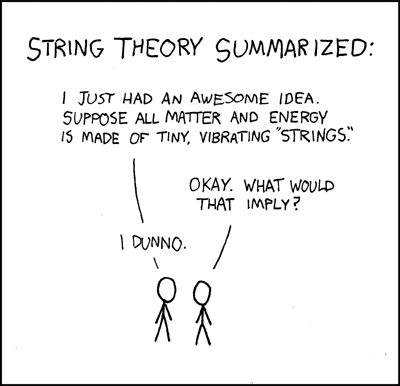171: String Theory
| String Theory |
 Title text: This works on pretty much every level. |
Explanation[edit]
String theory is a theory in theoretical physics for explaining how the universe works. It is a theory trying to explain everything belonging to our universe; specifically, it aims to unite general relativity and quantum field theories.
When a new theory is thought up, the theorists will usually supply some predictions, measurable by experimental physicists. String theory's predictions, however, are few and extremely difficult to test; although its inception was over forty years ago, string theory has yet to be experimentally tested.
Randall is unimpressed with string theorists (for another instance of this, see the punchline to 397: Unscientific). String theory has not provided any useful new knowledge to engineering science as quantum physics has, and lacks the imagination-stirring philosophical implications that the general population associates with other fields — for example, quantum scientists have proven predictions like tunneling, used by modern electronic devices, and relativity is relevant to modern systems like GPS navigation. String theory either hasn't reached that stage yet or cannot.
In the title text, Randall points out that string theory is so technically difficult that, at essentially every level (except, presumably, the very top), this explanation is as good as it gets.
Transcript[edit]
- [Heading above panel:]
- String theory summarized:
- [Two Cueballs are talking.]
- Cueball: I just had an awesome idea. Suppose all matter and energy is made of tiny, vibrating "strings".
- Friend: Okay. What would that imply?
- Cueball: I dunno.
Discussion
It should be noted that positive predictions are not sound scientific methodology. "If X, then Y will happen" doesn't prove X, because W and Q may also cause Y. You need falsifiability, the ability to disprove your model if it's wrong, in order to produce even a sound theory. Because of this, not only is string hypothesis not really sound science, but neither is a lot of Quantum Mechanics, which successfully predicts in sync with observations in a way that doesn't exclude other causes for the same outcomes. The geocentric model had a slightly better positive prediction success rate than quantum mechanics does...and they were wrong. Like the geocentric model, QM mostly made bad predictions at first, but its failures are constantly propped up with epicycles and deferents. Positivism and instrumentalism are bad science, and generally will lead knowledge in the wrong direction. — Kazvorpal (talk) 04:05, 6 October 2019 (UTC)
